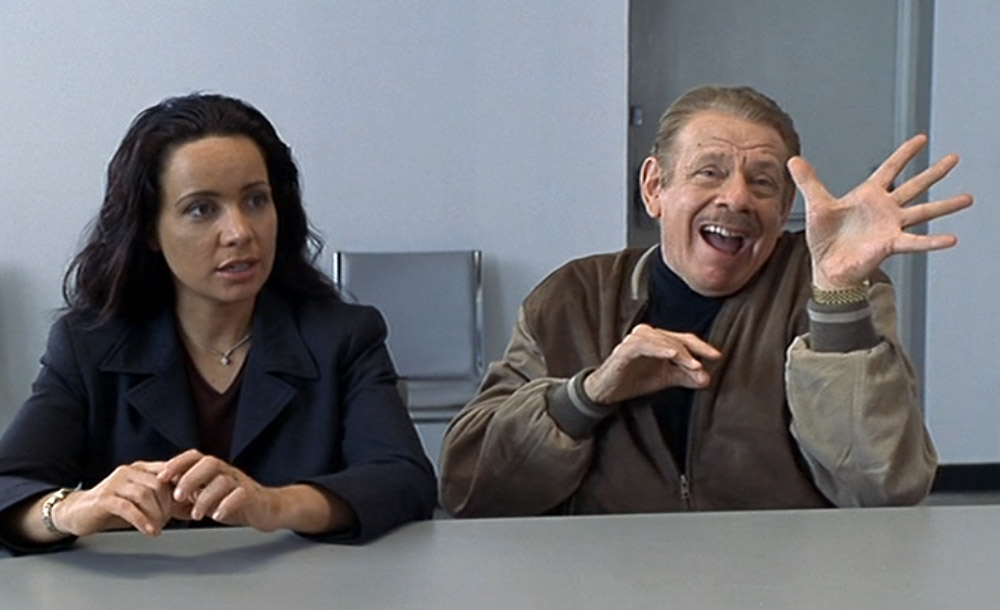Originally published in The Daily Texan in February 1, 2002.
“I think George Burns said when Groucho Marx died, ‘He didn’t really die. He just went up there and he’s sending his 8x10s down to all of us down here,’” said Jerry Stiller, a veteran of the stage and screen. “Of course, when the Marx Brothers disappeared, they didn’t really disappear — you see them. So there’s something about this big screen that really perpetuates your thinking and your life, your soul, whatever. The big question I always wonder about is what were those guys thinking, like the Marx Brothers, when they made those movies? Did they know they were doing it forever? A lot of actors and artists could just stay home and read a book, so I question the whole nature of what movies are all about and how these people stay with us.”
From the determined tone of Stiller’s voice, he sounds as though he is still playing the character of Morty Fineman, the schlocky B-movie director who is at the center of Stephen Kessler’s comedy “The Independent,” albeit Stiller is far more modest. The mockumentary charts the rise and fall of Fineman’s career, a nearly identical trajectory to that of Roger Corman, who made exploitation pictures in the 1970s and fell into financial ruin during the 1980s. Whether it is the hint of nostalgia that Stiller adds to his words or the small chuckles he derives when talking about the convoluted process by which “The Independent” has been released, known as “bicycling” as it slowly moves around the country, he acknowledges it’s a different time than when he first came up in show business, something the fictional Fineman doesn’t quite understand or enjoy in the film.
“Morty Fineman is a great opportunity because that guy has no connection,” said Stiller. “As an actor, you really have to live with the reality, or else you’ll pass into the universe and into the dust, and you’ll never work again. A lot of people in my field still have feelings of stardom and a place in their heads and their hearts of where they should be, and it works its way into what they play on the shows. It gets in the way sometimes of being able to get caught up in the moment.
“I play the part of a guy who doesn’t see anything else out there except himself. So I know the difference between what Morty should be or what Jerry Stiller would be and what Morty is and I can make that leap into this guy’s head — this egotist man with little talent but great drive and great perseverance and courage and a certain aesthetic ambiguity. He’s a guy who is walking in the desert and doesn’t have a canteen of water with him.”
With the exception of a particular scene where Fineman’s “The Whole Story of America,” which at a reported six hours in length, is the whole story of America, most of which has been set in the desert, Stiller hasn’t been stranded without a canteen for some time. Ever since Stiller met and married comic partner Anne Meara during the 1960s, the Stillers have become a staple of American pop culture. His son Ben has become one of the most bankable comic actors working today while his daughter Amy has started out on a filmmaking career of her own with her short “Amy Stiller’s Breast” — both can be seen in cameos in “The Independent.”
“The most pleasure I get out of my life is to watch my son and my daughter perform,” said Stiller. “If there’s anything in this whole business that makes me feel that I did the right thing, it’s the kids that did it on their own as performers. It’s turned out okay so far, and I’m really happy about that.”
Stiller’s immediate family may be doing well, and he made himself a part of everyone else’s as the cantankerous Frank Costanza, father to George on “Seinfeld.” After making his way into films during the 1970s such as “The Taking of Pelham 1-2-3” and “Airport ’75,” and a memorable turn in John Waters’ “Hairspray,” he has found a home in television where he now resides as Leah Remini’s father on “The King of Queens,” a role he relishes.
“It’s better than playing a grandfather in a movie,” Stiller jokes. “Actually, there’s a young boy floating around in this soul that doesn’t think he’s a father.”
However, Stiller has noticed a changing of the guard in the TV industry, and by extension in the film industry because of his age, something that’s played out in “The Independent” where Stiller’s on-screen alter ego Fineman chokes an intern who has little respect for him or his work.
“I would say there is a major distancing between the way things are thought of today by the people who are making the films, the younger people,” said Stiller. “There is a feeling that the veneration, the sentimentality for people who have been around in the business for a long time — it’s gone. Even some of the greats like [“M*A*S*H” creator] Larry Gelbart, some of the great television people who were directors, they’re not used anymore. They can do everything with a camera and they know more stuff just through the fact that it’s in their bones already. But the technology of making movies, the use of digital and the use of four cameras working at the same time sometimes, the new generation can do this like the back of their hand, so it’s a different world. You just have to understand that you can’t go back to one camera when now you can do it with three in one-third of the time. So you’re stuck with the wonderfulness of technology, but the work that went into creating the moment, there’s just no time for that. It’s just a series of rehearsals that are pieced together to create a performance today.”
Stiller had no such trouble on the set of “The Independent,” which took writer/director Stephen Kessler and producer Mike Wilkins nearly four years to bring to the screen.
“On a major movie, they’ll take a scene and they’ll do it for three days sometimes and today when you do an independent picture, you may do it in three takes. I’ve done John Waters in one take. The thing about it is there’s a Wild West shoot ‘em up feeling about the directors today. Somehow it’s freeing in a way. It gives you an opportunity to just fly with what you’ve got.”
For the moment, Stiller is taking a similar attitude towards life in general.
“I’ve done a few of these things in my lifetime now and I’m very proud of this particular one,” said Stiller. “They don’t have names anymore, these films, but it’s really wonderful to know that independent films are being recognized right now by audiences who have a sophistication and an awareness to what really moves them.”
Austin audiences can finally see the film this week again after its triumphant premiere at SXSW two years ago and while “The Independent” can be appreciated by any generation, Stiller admits there are some things about the current pop culture firmament that he still doesn’t quite understand, yet it hasn’t dulled his desire to try new things.
“I am so much aware of the fact that I don’t know anything about hard rock music. I don’t know the names of the artists, but I respect the fact these people are out there,” said Stiller. “I may not love everything they do, and sometimes I’m in total discord with what they do, but at the same time I respect the fact that somebody in their world connected with this generation.
“When I caught on with my wife Anne [Meara], when we started doing our act, we talked about two people who come from different backgrounds who find suddenly some connection. At that time, that wasn’t the fashion, but when we did it, some people said, ‘What the hell are they doing?’ And others said, ‘Gee, this is new, it’s unique. Let’s give it a shot.’
“I say, let’s give everything a shot. The fact that I’m older and I can dye my hair, knocked it down 10 years. It gives me a chance to be part of the now and there’s a certain joy in just performing and the fact that I still haven’t finished my work as an actor. I know that.”




